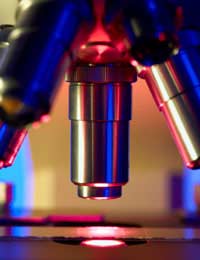Recent DNA Research and Developments

One of the exciting aspects of DNA is that it plays a significant role in many types of research around the world, from genetics and immunization to education and the development of medical treatments. In this sense, there are regular, new developments and it can be daunting to stay up-to-date on the rapidly changing worlds of forensic science, medicine and related fields where DNA takes on an important role.
Arsenic DNA and Early Life
While most people associate the chemical arsenic with killing life, recent research suggests that it may actually have contributed a key role to the origins of life on our earth. A respected professor at a university in the United States believes that arsenic might have been a vital ingredient for early life forms. One of the reasons for his beliefs relates to the way that arsenic - recognised by most of us for its effect as a toxin - behaves in a similar way to phosphorus. Phosphorus was a vital ingredient in virtually every living organism, which has spurred the idea that arsenic may have played a closely related role to life forms. In fact, there would have been more arsenic than phosphorus present in the oceans at that time. In the case of phosphorus, the work of microbes would have been required to 'release' phosphorus from rocks while conversely, arsenic would have been able to dissolve from hydrothermal vents.As to how this relates to DNA, you have to look at the way that phosphorus is a part of the building aspect off the DNA backbone. By binding to four oxygen atoms to create a negatively charged phosphate ion, phosphorus contributes to the DNA double helix backbone. Not only that, but phosphorus is also important in adenosine triphosphate - or ATP - which is integral to providing energy to the majority of life forms on our earth. As such, it is thought that arsenic could have fulfilled similar roles to early life.
Universal DNA Database
While national DNA databases holding the DNA of arrested or convicted criminals are a reality for most of us and tend to bring forth a great deal of controversy, imagine the prospect of a universal DNA database. This is one avenue that is currently undergoing consideration in the United Kingdom (UK). What this means, however, is that every single person in the UK would be a suspect for any crime that is committed on national soil. Support for a universal database cites our ability to potentially solve a greater number of crimes. Those opposed to a universal database believe that the loss of privacy and personal freedoms far outweigh the benefits of a universal DNA database. Given that the UK database is already the largest in the world and is so extensive in comparison to DNA databases in other countries, some people feel that it's only a matter of time before the UK implements a universal database. Hopefully, there will be sufficient public debate and transparency on the issue before this type of database is implemented.DNA Syringe
Research investigating a DNA syringe has provided some interesting benefits by facilitating wound healing and restoring damaged nerves. The syringe works by injecting DNA into the body to allow for insertion into cells. Then, an electric current is used to allow DNA to successfully move across cell membranes. Still, one challenge is that any electrical stimulation could also destroy cells, which means that careful examination and research needs to be performed before this type of syringe is concluded to be safe for widespread use.Whether DNA developments involve genes or the ethics of DNA databases, the importance of DNA in all of our lives continues to become increasingly more dominant. You can stay on top of the most recent advancements by regularly reading and listening to the news. You can also read about specific resources that cover DNA and its many roles in the human body or its numerous other applications.


Re: How was DNA Discovered?
DNA is not a real thing, the earth is flat, the sun is blue
Re: An Overview of DNA Functions
I tried to extract DNA from my refrigerator, now I have no refrigerator and my food is rotting.
Re: The Properties of DNA
what are 5 characteristics of DNA?
Re: How was DNA Discovered?
betty for the last time im trying to sleep bugger of babe
Re: How was DNA Discovered?
It is past you bedtime winnie pleas go to bved now or no france for you go back to easter island looser!!!
Re: How was DNA Discovered?
My bed time is at 9:00 and it is 9.01 in indea at the moment> i am sooooooooo naughty
Re: How was DNA Discovered?
ICE ICE DAVEY
Re: How was DNA Discovered?
This sorkis absalutely propostuous I found out about DNAfirst these loosers lied
Re: How was DNA Discovered?
meow
Re: How was DNA Discovered?
this workis realy interresting i would love to disscus more about this with you